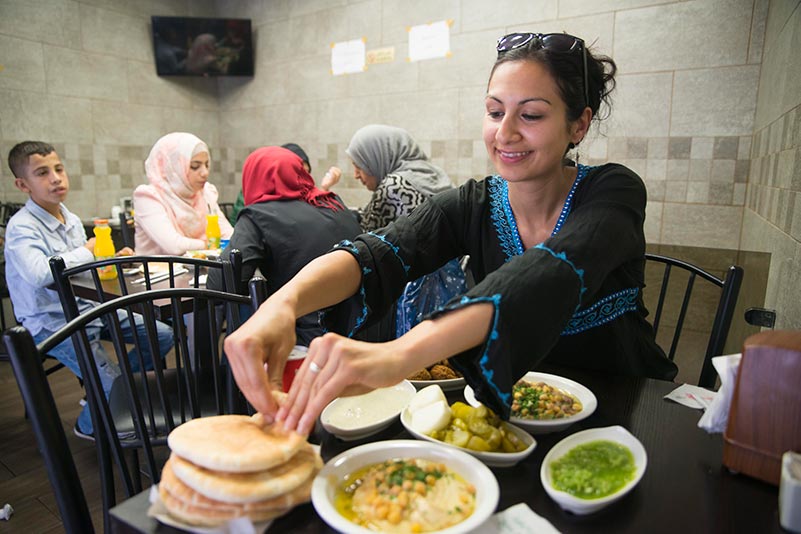Burned out by a high-intensity career in human rights advocacy, Yasmin Khan turned to cooking. The acclaimed British cookbook author soon discovered that writing about food and the people who make it was another way to celebrate humanity.
Khan’s debut, The Saffron Tales: Recipes from the Persian Kitchen, was named one of the best cookbooks of 2016 by The New York Times and The Wall Street Journal. The book spotlighted recipes from Iran – Khan’s mother’s homeland – and anecdotes from Khan’s life as a Brit of Pakistani-Iranian descent.
For her second cookbook, Khan shifted her Middle Eastern culinary focus to Palestinian cuisine. Visiting the homes of Palestinian chefs enabled Khan to capture their techniques and personal stories. Zaitoun became a hit in Khan’s native London, earning acclaim from Nigela Lawson and Yotam Ottolenghi and spurring publication in the US earlier this year.
Yasmin Khan Turns Burnout into Inspiration
Khan wrote her first cookbook after suffering from Chronic Burnout Fatigue as an activist. “So often in today’s world, if we’re tired, we have a coffee; if we have a headache, we take some medication,” she says. “We’re told to push on and repress how we’re feeling. But this was an exhaustion on a level I hadn’t felt before.”
During this setback, food became a comfort for Khan. “My mom says that I started cooking at around the age of 10,” she recalls. “I announced to her that I didn’t like her food, which is ridiculous because she’s such a good cook. I was a cheeky little kid.”
However she felt about her mom’s cooking as a child, the richness of the Persian kitchen called to Khan. She published Saffron Tales with striking photography and recipes gathered during travels in Iran.
Showcasing Culture Through Cuisine
Ever the activist, Khan saw her work as a way to showcase the richness and diversity of Middle Eastern culture and cuisine. Khan cites one of her heroes Claudia Roden (author of The Book of Jewish Food: An Odyssey from Samarkand to New York), as inspiration for her food-based human exploration: “It’s such an incredible anthology and anthropological study of different Jewish cuisines from around the world.”
“After I finished “The Saffron Tales,” which was so clearly about fighting the stereotypes of the Middle East, when I looked at where I could go next for another book, the Palestinian kitchen seemed to be the perfect place to go,” she recalls.
“Let’s tap into the richness of people’s histories, whose cultures you associate with violence, and tap into the exquisiteness of their cuisine and the joy of their everyday lives,” she says.
Yasmin Khan Takes her Time with Food
Part cookbook, part anthropological study, Zaitoun features the distinct foods of Palestinians in a wide range of locations. Khan discusses both the diversity of the cuisine, and the similarities she found in the 80+ kitchens she visited.
“Yogurt is a staple…in one form or another,” her cookbook reads. “Fresh salads of seasonal vegetables are a must.”
Khan also notes that Palestinian meals frequently felt less rushed or constrained than the meals she was used to – something Khan appreciates amidst the stress of daily life. “Palestinians wholeheartedly embrace relaxed and informal eating, which is one of the many reasons that I adore Palestinian food.”
For more recipes and glimpses into the Palestinian Kitchen, Zaitoun is available for purchase online.



